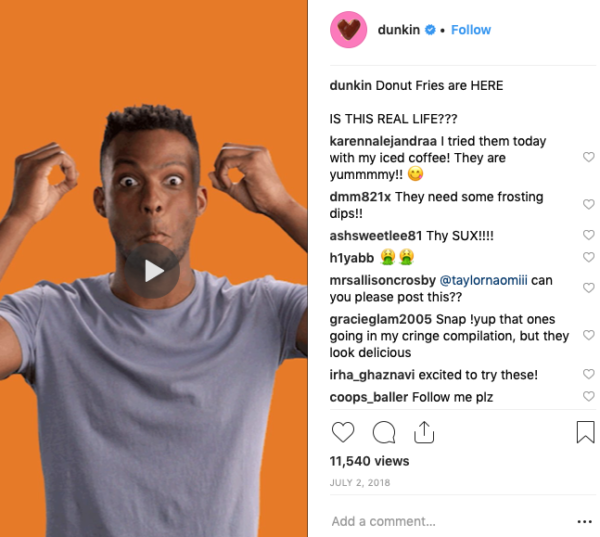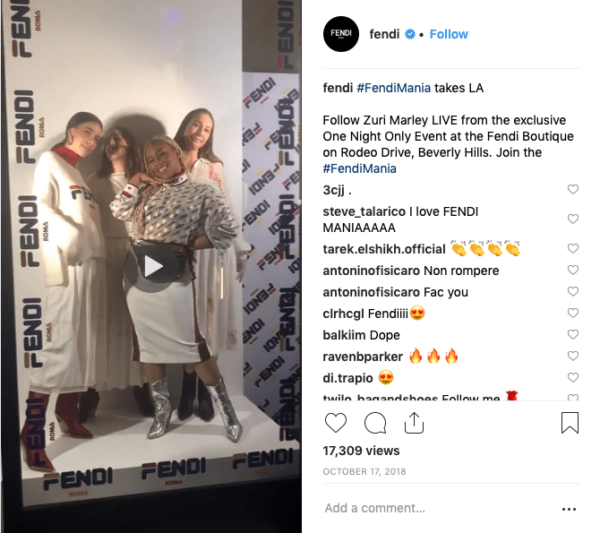The social media feed of today is replete with video content as opposed to text and images.
More video content is uploaded in 30 days than the major U.S. television networks have created in 30 years. – (Source)
Social algorithms have evolved to prefer video content over other content formats. Social media users drool over videos. The content type is juicier, more presentable, and gives more information in less time.
86% of businesses use video on their website and 77% use video on social media – (Source)
Videos are more likely to go viral and get the brand message across to a larger number of people.
1.2% of videos on Facebook go viral. – (Source)
Wondering how to extract the most from this exciting trend? Let’s learn with the help of some interesting examples:
Facebook is a place for both B2B and B2C businesses to create useful and entertaining video content. It’s a platform where people like to watch a variety of videos: standup-comedy, cultural content, how-to videos, current affairs, and DIY, etc. Facebook users are looking to have fun. They love sharing videos that explore something new and unique.
Here’s an interesting example of a recipe video from Blendtec blenders:
This Zucchini Carbonara looks amazing! Check out this killer recipe by Chloe Moir Nutrition FULL RECIPE: https://bit.ly/2H4vS0R
Posted by Blendtec on Sunday, January 27, 2019
Marketers can choose a topic and style the suits their business and audience. Native and live videos work better. A Facebook live video has automatic notifications ensuring more viewership for such content. Take a look at this innovative live stunt by Buzzfeed:
Watch us explode this watermelon one rubber band at a time!
Posted by BuzzFeed on Friday, 8 April 2016
The video got over 11 million views and 17k shares!
Marketers can look at the viewers’ comments in a live video to reply and engage with them in real time. A good idea is to assess which moments of the video received the highest user-interest and use the insights in the next videos. Facebook is the largest social media channel in terms of users. It’s a must-have channel to promote shareable videos for more visibility.
YouTube
YouTube is a hub of videos from everywhere. It’s the world’s second most popular website. The platform demands regular content. When aiming to create a high-flying YouTube channel, the content should be sharp and path-breaking.
Marketers must optimize YouTube videos for search by adding the relevant tags, titles, and meta descriptions. Another way to grab audience attention is to have an attractive thumbnail image.
A cool tactic is to push YouTube content through paid ads and get more reach. Video types that work on YouTube include:
- Case studies
- Product demos
- Lists
- How-to videos
- Entertaining web series
Lego, the popular toy brand has a YouTube channel dedicated to children. The channel has over 7 million subscribers. Take a look at this video from its animated cartoon series for children:
Starbucks is another brand that has been quite consistent on the platform. Take a look at this how-to video from the coffee chain:
The video got over a million views. A good way to embark on your YouTube journey is to do a competitive audit and find content gaps. Start thinking like a media company if you can and that could make all the difference.
LinkedIn is a treasure trove of B2B leads. Marketers can create expert video content to get more views and participation in their LinkedIn post updates. It’s a platform where personal profiles do better than business pages helping company executives to use personal branding as a way to get more leads and conversions. Here are some video types that work well on LinkedIn:
- Videos that display thought leadership
- Recruitment videos
- Videos showcasing case studies and testimonials
- Company news and announcements
- Opinion videos
- Expert interviews
Take a look at this example:
LinkedIn and video is quite a combo for B2B marketers looking to create an impact while getting more business.
This social platform cuts out the noise and displays everything that looks beautiful. Instagram is a visual delight and an entertainer, which is why many more users are embracing this social media platform.
Instagram saw the largest growth in driving purchases over any other social media platform, increasing from 31% in 2017 to 48% in 2018. (Source)
The platform has a limit of 60 seconds for videos published in its main feed. A marketer looking to make videos for Instagram should absorb the relaxed vibe of the social network. It’s good to make use of some of Instagram’s trending features such as stories and IGTV. The length capping for stories is 15 seconds while for IGTV it’s 10 minutes.
Take a look at this example of an IGTV video from Dunkin Doughnuts:
The fashion brand Fendi uses IGTV to showcase happening event videos like this:
Instagram is a mecca for brands looking to enthrall their audience with visual stories.
Twitter’s about short-form content. The microblogging platform is a great place to share tutorial videos to get the likes and RTs flowing. Quick videos like this one from Lay’s also do quite well on the platform:
Make your New Years celebration pop with a bag of #Lays Poppables! #HappyNewYear pic.twitter.com/yt4u4P5uDM
— LAY'S (@LAYS) December 31, 2018
GIFs do well too. Take a look at this inspirational one from MailChimp, the popular email marketing tool.
This year, we skipped resolutions. To celebrate all of your hard work, we collected your advice for small businesses everywhere. Here are some of our favorite words of wisdom. pic.twitter.com/3TMhjxDUtP
— Intuit Mailchimp (@Mailchimp) January 18, 2019
Twitter’s not that big but does promise quick results if the video content is catchy and precise.
Getting Started
Getting on the video bandwagon may seem like an uphill task in the beginning. The best way to start is to decide on 1-2 focussed channels. A business selling a software product should eye LinkedIn, for instance. A fashion business should think of Instagram first and so on. It’s good to have a definite goal for social media video marketing: awareness, engagement, leads or conversions. Creating professional videos may require a large budget, but there are quite a few cost-effective video creation tools available as well. With social media platforms evolving every day, it’s essential to keep a track of the latest social video specs.
The audience on social media has short attention spans. Viewers are looking for concise and snackable content. It’s better to keep video content short and exciting – 60 seconds is a good length. Marketers can take inspiration from other successful video communities.
Keeping in mind the needs of the audience, it’s a good strategy is to optimize video content for the mobile device. A call-to-action is your bread butter for leads and conversions.
Over To You
Social media and video is a killer combination. Creating videos that appeal to a niche audience is not easy but if you can manage it then the sky’s the limit. Each platform has a large audience, so it’s beneficial to stay native. Video’s not a short-term tactic, so marketers should create lots of content before they can start getting recurring results. The aim should be to get more fans who love and share your content. Video entails a lot of hard work but not without the incredible results that follow.

